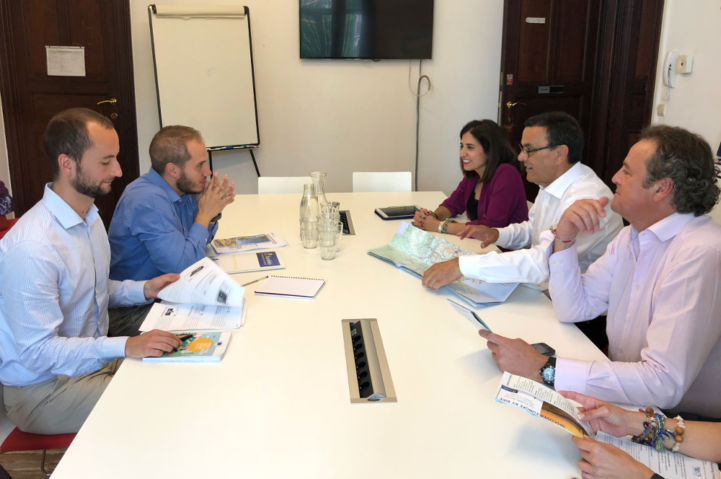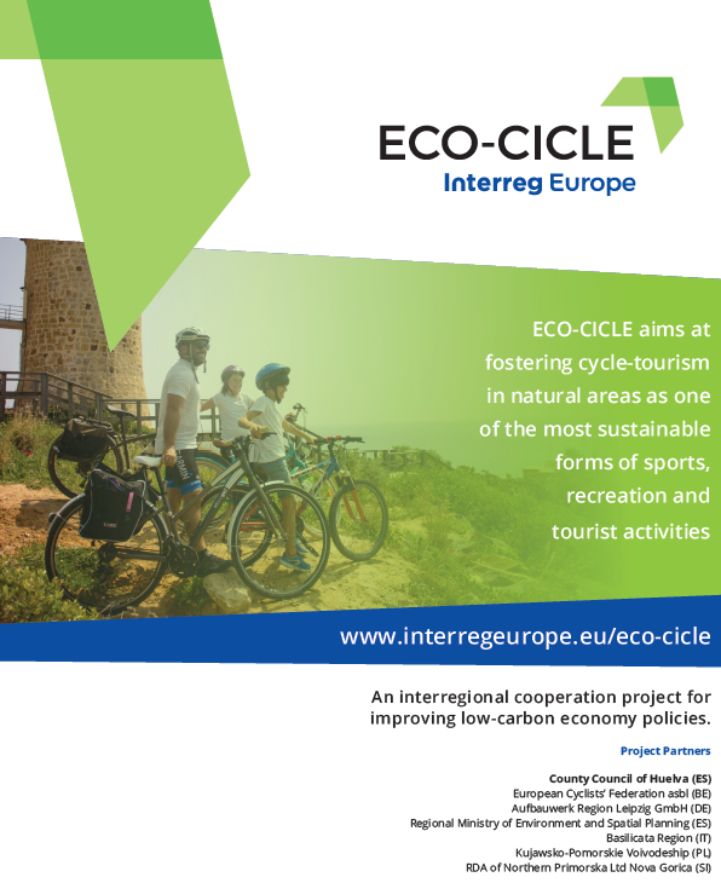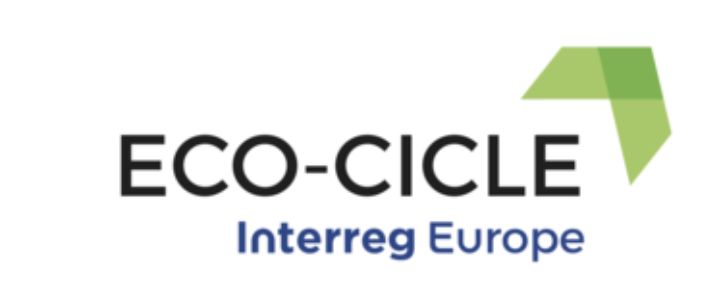Discover the ECO-CICLE project: European network for the promotion of cycle tourism in natural areas

The objective of the meeting was to address the most essential points of the ECO-CICLE project, approved in the framework of the third call of Interreg Europe. ECF is a key partner of this project, together with six other organisations among which the County Council of Huelva is the lead partner. Other partner organisations are the Kujawsko-Pomorskie Voivodeship (Poland), the Aufbauwerk Region Leipzig GmbH (Germany), the RDA of Northern Primorska Ltd Nova Gorica (Slovenia), the Basilicata Region (Italy) and the Regional Ministry of Environment and Spatial Planning (Seville, Spain).
ECO-CICLE developed from the experience gained by the County Council of Huelva in promoting cycle tourism both locally and regionally, through the strategic framework supported by the 2014-2020 Plan for bicycle in Andalusia. As a third of the province of Huelva is under specific environmental protection, an interest in fostering cycle tourism in natural areas has grown naturally. The County Council of Huelva then contacted ECF to launch the ECO-CICLE cooperation project, in which ECF assumes the advisory role. The partners were chosen based on several criteria such as the interest and capacity to influence policy instruments managing structural funds and the extension of protected areas in the territory.
It is the EuroVelo, cycle tourism and regional policy unit of ECF which is the ECO-CICLE partner as the focus of the project is on cycle tourism in natural heritage spaces, and also on improving local and regional policies related to the promotion of this activity. Moreover, several partners (LP and PP2, 5 & 6) are also contributing to one of the 15 transnational EuroVelo routes, and the ECO-CICLE project itself will contribute to the EuroVelo network. It will allow to create a connection between EuroVelo 1 – Atlantic Coast Route in Algarve and EuroVelo 8 – Mediterranean Route in Cadiz through the natural area of Doñana in Andalusia. ECO-CICLE will thus certainly interest the EuroVelo audience.
EV1_8 Caption
However, ECO-CICLE has to tackle a few issues, related to the development of a sustainable tourism model in the frame of protected areas and to the lack of consistency and visibility when addressing the operational programmes managing structural funds. On the one hand, as most of the territories covered by ECO-CICLE have extended protected areas, they are very sensitive to economic development, including the development of a cycle tourism scheme, and they require additional attention in order to ensure preservation and respect of biodiversity. And on the other hand, it is not always clear for local administrations in charge of managing the natural heritage how to access structural funds investments through the operational programmes, as the category can be either tourism, natural heritage, sustainable transport or land-use for local development planning. ECO-CICLE aims to establish an expertise at operational programme.
Therefore, we understand that ECO-CICLE’s objectives tackle different areas:
- A dimension of sustainable tourism: ECO-CICLE aims to promote cycling in natural spaces, based on both a tourism and an environmental perspective, and in this way to give impetus to sustainable mobility beyond the strictly urban environment.
- A dimension of economic revival: bringing tourism to unexplored natural spaces will create new services and jobs and increase growth in remote areas, and will help the move towards a green and competitive economy.
- A dimension of assistance: ECO-CICLE also aims to increase the capacities of local authorities to promote sustainable mobility and to identify what European * Territorial Cooperation (or Interreg) programme is most adapted to their projects, in the fields of the protection and development of natural and cultural heritage.
- A dimension of networking: ECO-CICLE wants to create a European Network of Local and Regional Authorities for the promotion of cycle tourism in natural spaces. This network will enable partners to advise each other depending on their expertise.
The ECO-CICLE project is taking place from 1 June 2018 to 31 May 2022 and is divided in two phases, each lasting two years. The project budget amounts to 1,353,495€, of which Interreg Europe contributes 1,117,914.15€.


Here are the policy instruments that the project addresses:
- ERDF Operational Programme Andalusia 2014-2020 Autonomous Regional Government of Andalusia, Axis 4, for which the Regional Ministry of Environment and Spatial Planning is responsible.
- Regional Operational Programme of Kujawsko-Pomorskie Voivodeship 2014-2020, for which the Kujawsko-Pomorskie Voivodeship is responsible.
- Charta of the Leipziger New Lakeland 2030, for which the Administrative District of Leipzig is responsible.
- Operational Programme for the Implementation of the EU Cohesion Policy 2014-2020, Republic of Slovenia (OP), for which the Government Office for Development and European Cohesion Policy, Cohesion Policy Department is responsible.
- Basilicata Regione Development Pact, for which the Basilicata Region is responsible.
More information is available on the ECO-CICLE project’s website.
In conclusion, the ECO-CICLE project is very promising for cycling tourism and sustainable mobility, and a big step in the direction of the EU2020 strategy fostering sustainable environmental development.

